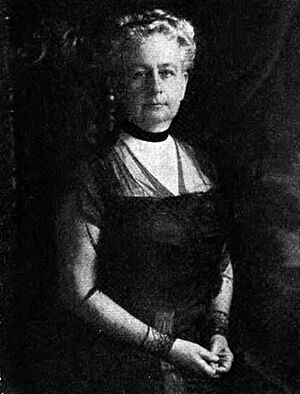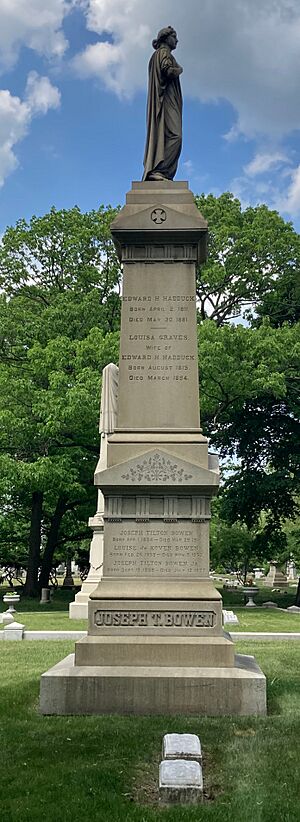Louise DeKoven Bowen facts for kids
Quick facts for kids
Louise DeKoven Bowen
|
|
|---|---|

DeKoven Bowen in 1922
|
|
| Born |
Louise DeKoven
February 26, 1859 Chicago, Illinois, United States
|
| Died | November 9, 1953 (aged 94) Chicago, Illinois, US
|
| Burial place | Graceland Cemetery |
| Nationality | American |
| Occupation |
|
Louise DeKoven Bowen (born February 26, 1859 – died November 9, 1953) was an American woman who helped her community in many ways. She was a philanthropist, which means she gave money and time to good causes. She was also a suffragist, working to get women the right to vote.
Louise came from a rich family in Chicago. She believed that with wealth came a duty to help others. She gave a lot of her own money to different groups. She also raised money from other wealthy families in Chicago. Even though she wasn't trained as a social worker, she was a respected leader in helping people.
She worked with a place called Hull House, which was a community center for people in need. She also helped change the court system for young people through the Juvenile Protective Association. Louise was very active in women's clubs and groups that fought for women's right to vote. One of her main goals was to improve dance halls in Chicago, making them safer for young people. Throughout her 94 years, she worked hard to help those who were poor or didn't have many rights, especially focusing on women, children, and their families.
Contents
Early Life and Education
Louise DeKoven Bowen was born in 1859 in Chicago, Illinois. Her parents were Helen Hadduck and John deKoven, who was a banker. In 1875, she finished school at Dearborn Seminary.
Louise was an only child and inherited a lot of money. She was taught that she should use her wealth to help her community. She started her community work at St. James Episcopal Church. There, she taught Sunday School and started a club for boys. Even though she felt that women had limited roles in the church, she remained a member her whole life.
Helping Her Community
Louise Bowen's work to help others spread beyond the church. She became a leader in many groups across Chicago, and even at the state and national levels.
Working at Hull House
In 1894, Louise first got involved with Hull House. This was a famous "settlement house" in Chicago, a place that helped poor people and immigrants. Jane Addams, who founded Hull House, asked Louise to lead the Women's Club there.
Soon, Louise became a trustee (a person who manages an organization) and the treasurer (the person in charge of money) for Hull House. She held the treasurer position for 53 years! She was a major donor and helped raise most of the money for the organization. She even built a Boys' Club building for them. In 1912, she created a summer camp for Hull House's poor children, called the Bowen Country Club in Waukegan, Illinois. Today, it's known as Bowen Park. Louise stayed involved with Hull House for the rest of her working life. After Jane Addams passed away in 1935, Louise was the president of the Hull House board for nine years.
Improving the Juvenile Court System
Louise Bowen worked with other reformers, like Julia Lathrop, to create a new court system for young people in Chicago. This was a big deal because it was the first juvenile court in the United States, opening in Chicago in 1899.
A group called the Juvenile Court Committee of Chicago helped watch over this new court. Louise became the main leader of this group. During her seven years in charge, the Committee paid the salaries of probation officers (people who help young offenders). They also helped choose these officers and looked into complaints of neglect. They even sat in juvenile court to give advice to judges and set up a home for young people who were detained.
In 1907, the Juvenile Court Committee became the Juvenile Protective Association. Louise became its first president and held this job for 35 years. Through this role, she wrote many important reports. One report from 1913, called “The Colored People of Chicago,” showed how Black people faced unfair treatment in schools, jobs, housing, and entertainment.
Fighting for Women's Rights
Louise Bowen was a key leader in the movement to get women the right to vote, known as women's suffrage. She was president of the Chicago Equal Suffrage Association and vice president of the Illinois Suffrage Association. She also worked as an auditor for the National Woman Suffrage Association, which meant she traveled and spoke all over the country.
In 1912, when Theodore Roosevelt supported women's suffrage, Louise campaigned for him. In 1916, she organized a march of 5,000 women to the Republican National Convention. They marched through heavy rain and arrived right after someone had said that women didn't want to vote. Louise and other upper-class women helped make the suffrage movement seem more serious and important. This was a big reason why women in Illinois gained the right to vote in 1913.
After women got the right to vote, Louise worked to help women register to vote. She also encouraged them to vote and even run for office. She herself almost ran for the Cook County Board and for mayor of Chicago.
Louise also used her power as a company owner to improve conditions for workers. In her book, Growing Up With a City, she wrote about how she gathered facts about women working at night. She then personally asked Cyrus H. McCormick, the president of International Harvester Company, to improve poor working conditions for women and to pay them a fair minimum wage.
Other Community Work
Louise Bowen held many other important roles in her community. She was president of the Chicago Woman's Club and president of the Woman’s City Club of Chicago from 1914 to 1924. Because of her leadership, both Chicago city and Cook County officials often asked for the Woman's City Club's opinions on public policy. She also served as vice president of the United Charities of Chicago.
During World War I, she was the only woman chosen to be on the Illinois Council of Defense. She used her connections with other women activists to help women's groups across the state support the war efforts. In 1922, Warren G. Harding, who was president at the time, chose her to represent the U.S. at the Pan-American Conference of Women. Even after she retired, she continued to be active, helping others even after major world changes like World War II.
Awards and Recognition
Louise Bowen received many awards for her public service during her life. In 1939, she was honored by the Chicago Institute of Medicine for her long work with hospitals and health groups. In 1941, she received the first Gold Medal for Distinguished Service given to a woman by the Rotary Club of Chicago.
Personal Life
Louise married a banker named Joseph Tilton Bowen in 1886. They had four children: John DeKoven Bowen, Joseph T. Bowen, Helen Hadduck Bowen, and Louise DeKoven Bowen. Louise Bowen passed away from a stroke in 1953 in Chicago. She is buried in Graceland Cemetery.
Legacy
Louise DeKoven Bowen's important papers are kept in the Richard J. Daley Library Special Collections and University Archives at the University of Illinois at Chicago.
Selected Books
- The Colored People of Chicago (1913)
- Safeguards for City Youth at Work and at Play (1914)
- Growing Up With a City (1926)
- Open Window: Stories of People and Places (1946)
 | Precious Adams |
 | Lauren Anderson |
 | Janet Collins |


